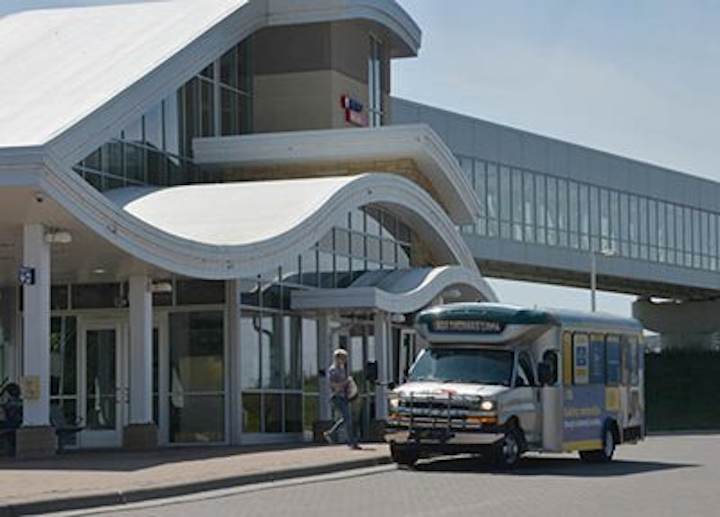
The study looks at transit service throughout the region. Pictured is a Minnesota Valley Transit Authority Route 384 bus serving Eagan and Apple Valley.
Met Council
Transit planners at the Metropolitan Council (Met Council) have been evaluating how transit services are distributed across the Twin Cities region, with the goal to build on the work already done to create today’s transit system and match the expansion of service to the values reflected in a shared vision for transit.
A systemwide look at transit in the region
At a basic level, studying a transit system looks at the ridership data and seeks feedback from riders and potential riders, evaluating those data and inputs. The Transit Service Allocation Study’s strives to build better policies so that the future expansion of the transit system better reflects that shared vision, says Met Council.
“One way we’re doing this is by pulling together policy makers from across the region and listening to what transit means for their communities,” said Nick Thompson, the Met Council’s director of transportation services. “And, that also includes community leaders who represent cultural groups, businesses, education providers, workforce organizations and of course the transit providers themselves.”
“What is great about this study,” Council Member Judy Johnson added, “is that it’s about that big picture vision of an expanded transit system that serves the region well into the future. While it includes all the individual providers, like those from my district, it hinges on us working together as a system to best serve the people who rely on and want to use transit, now and going forward.”
Progress on the study
The study has reached its midpoint and has produced several pieces on the evaluation to date, starting with a review of existing conditions, outreach to each of the region’s transit providers and a workshop with more than 45 policy makers and community leaders representing the region.
Met Council says that workshop was a key component in working to create a shared vision and better understand the values the region should focus on when expanding the transit system. It delivered key data points about how groups of people were using the transit system before COVID-19 and polled the attendees on trade-offs. Finally, the large group split off into smaller groups to answer questions that expanded on these tradeoffs.
In both planning scenarios, service distribution will use an equity lens to distribute expanded services to communities of color and low-income populations.
Building and weighing scenarios
All this work to date has led to developing two hypothetical transit expansion scenarios that are intended to be quite different from each other, but certainly have some crossover. The difference will help us understand how policy choices can create entirely different outcomes for the region.
Scenario 1: Invest additional resources in improving transit that serves all trip types
The goal of this scenario is to expand the range of communities where it is possible to live without a car. The focus will be on increasing the amount of service that is convenient and can be depended on for all trip types — high-frequency, all-day, all-week service. This scenario prioritizes expanding service to areas of highest transit use potential and maximizing ridership. Service distribution will use an equity lens to distribute expanded services to communities of color and low-income populations.
Scenario 2: Invest additional resources in increasing regional access to transit
The goal of this scenario is to strengthen connections to suburban jobs and opportunities throughout the fixed-route transit service area. The scenario prioritizes suburb-to-suburb transit access, reverse commute services and job access for suburban residents. Expanding service to areas of highest transit use potential will be a secondary priority. Service distribution will use an equity lens to distribute expanded services to communities of color and low-income populations.
The study will move into its final phase where it will evaluate these scenarios and make recommendations about how the scenarios can reflect the values of the region through transit policy. That outcome will help the Met Council as it builds policies that will both help the system through recovery, and guide work on future expansion of the transit system.
"complete" - Google News
July 21, 2020 at 11:55PM
https://ift.tt/32IyYFd
Met Council's regional transit study assesses complete system with an eye to future expansion - MassTransitMag.com
"complete" - Google News
https://ift.tt/2Fvz4Dj
https://ift.tt/2YsogAP
Bagikan Berita Ini














0 Response to "Met Council's regional transit study assesses complete system with an eye to future expansion - MassTransitMag.com"
Post a Comment